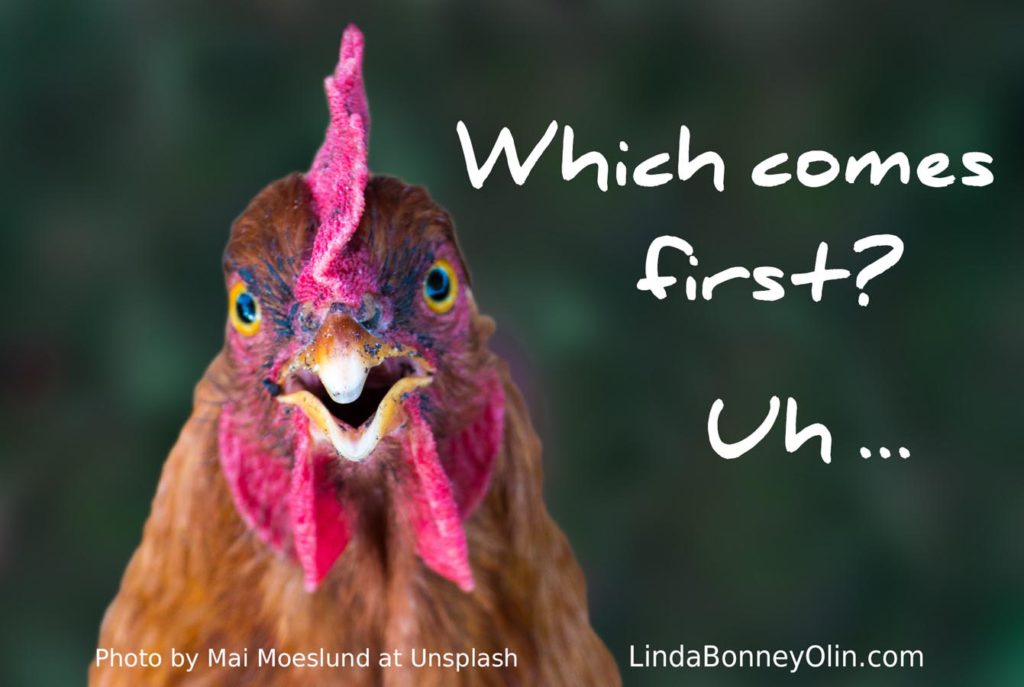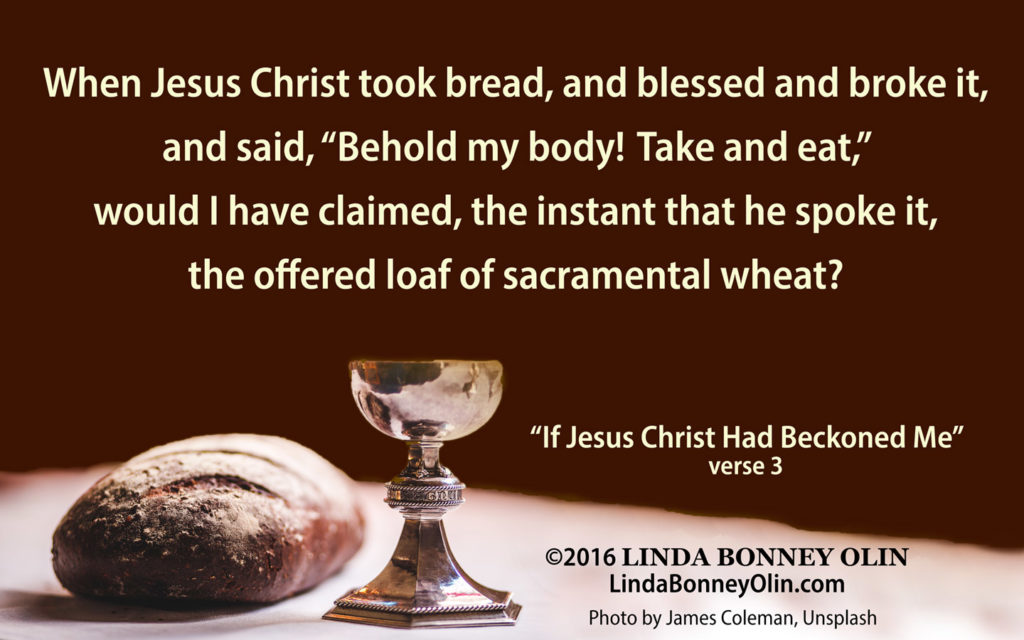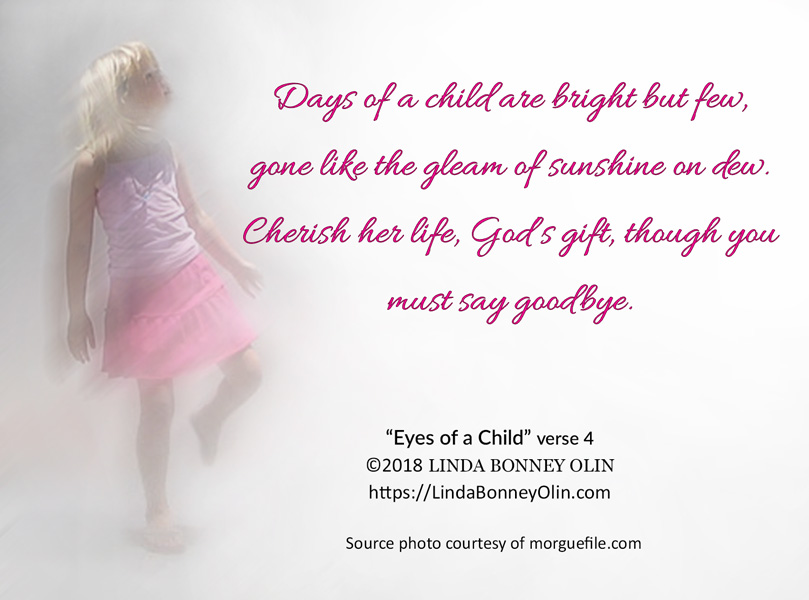 Which comes first, the words or the music?
Which comes first, the words or the music?
Well… yes. Like the chicken and the egg, a hymnwriter can go either way.
Words First
For me, writing a new hymn often begins with an idea for the words (aka text or lyrics). Perhaps some situation in my life or in the world around me suggests a musical parable. Perhaps my Holy GhostWriter prods me to explore a particular Bible passage or theological concept. Perhaps a hymn-writing competition specifies a theme or occasion to write about. Perhaps an intriguing turn of phrase begs to be rhymed and set to music.
Ideally, while I’m writing the words a good tune bubbles to the surface of my memory or imagination. If my verses have a commonly used meter (pattern of syllables per line), I might pick a suitable tune from the metrical index in the dog-eared back pages of my hymnal. Otherwise, a scrounge through the archives of public domain hymn tunes (and maybe a tweak or two to the existing notes) may be necessary to get the right musical setting.
 For example, the communion song titled “If Jesus Christ Had Beckoned Me” sprouted words-first, from a discussion about the reluctance of many churches to serve Holy Communion every Sunday. The reasons for their lack of enthusiasm for the Lord’s Table made me wonder. Would everyone say the same excuses to Jesus’ face if he were standing in front of them in the flesh, holding out the bread and cup?
For example, the communion song titled “If Jesus Christ Had Beckoned Me” sprouted words-first, from a discussion about the reluctance of many churches to serve Holy Communion every Sunday. The reasons for their lack of enthusiasm for the Lord’s Table made me wonder. Would everyone say the same excuses to Jesus’ face if he were standing in front of them in the flesh, holding out the bread and cup?
This meditation led to a text of four stanzas, with a metric pattern of 11 10 11 10 11 10 11 12. Unfortunately, hymn tunes with that meter aren’t exactly falling off the trees like autumn leaves. After a considerable hunt, the text finally found a good home with LONDONDERRY AIR (“Oh, Danny Boy”). I also tweaked a less familiar tune named GLENDALE to fit the same text, for singers with a less ambitious vocal range.
Music First
Some of my songs grow in the opposite direction, from music to words. My newest one, “Eyes of a Child,” is a good example of lyrics being inspired by the emotion and phrasing of a piece of music.
A few weeks ago, pianist Andrew Remillard recorded an obscure hymn tune named ST. AELRED, composed by John B. Dykes in 1862. Andrew’s slow, haunting rendition fascinated me.
Listen to ST. AELRED without looking at the lyrics. Can you feel the bittersweet pang of love and loss, as I did? As I listened over and over again, the phrasing of the final three notes, played so slowly and tenderly, seemed to whisper, “Say … good … bye …”
Now listen again. This time, read the words I wrote in response to the music.
(Note: Andrew plays the tune through three times, but there are four verses to my text.)
Eyes of a Child
*If sung for a particular child, change to the appropriate gender-specific pronoun.
1. Eyes of a child with wonder glow,
sensing God’s grace wherever they go.
Cherish their* soul and help them* grow,
then say goodbye.
2. Lips of a child are free of guile,
speaking the truth or beaming a smile.
Cherish their* kiss for this short while,
and say goodbye.
3. Arms of a child, with instinct strong,
reach for the one with whom they belong.
Cherish their* hugs your whole life long,
but say goodbye.
4. Days of a child are bright but few,
gone like the gleam of sunshine on dew.
Cherish their* life, God’s gift, though you
must say goodbye.
© 2018 Linda Bonney Olin
I’ve mentioned before how speeding up or slowing down a tune can give it a very different feel. ST. AELRED is a versatile tune that can be used for a variety of occasions depending on the tempo. As you might guess from the very slow and tender way Andrew Remillard played it, the occasion that first came to my mind was a child’s funeral. But death is not the only leave-taking for a child. Sung at a brighter tempo, “Eyes of a Child” could serve equally well for a coming-of-age event where we say goodbye to a child or young adult and celebrate the time we had together.
In fact, since “Eyes of a Child” hit Facebook and YouTube, I’ve heard ideas to use it for a dedication of students and parents at the start of the school year; a memorial service for aborted babies on the Catholic Feast of the Holy Innocents; graduation, baccalaureate, and confirmation ceremonies; blessings for soldiers being deployed overseas; even the father-daughter dance at a wedding reception!
Church musicians are an inventive bunch. If you think of other suitable occasions, please share your ideas in a comment.
Being brand new, “Eyes of a Child” does not appear in any of my books. If you would like a PDF score for your church, please send me a request via the contact form here at Faith Songs, or via private message on my Facebook page. Be sure to mention the occasion you’d like to use it for.
“If Jesus Christ Had Beckoned Me” is #18 (LONDONDERRY AIR) and #19 (GLENDALE) in Now Sings My Soul: New Songs for the Lord.
Blessings,
Linda

